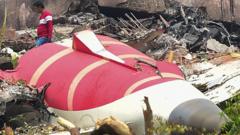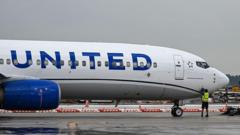India's Aircraft Accident Investigation Bureau (AAIB) is in the process of determining whether to send the flight data and cockpit voice recorders from the recent Air India crash abroad for further analysis. The Boeing 787-8 Dreamliner, which was headed to London, tragically crashed shortly after takeoff from Ahmedabad airport last Thursday, resulting in at least 270 fatalities, primarily among passengers.
India to Evaluate Overseas Analysis of Air India Crash Black Boxes

India to Evaluate Overseas Analysis of Air India Crash Black Boxes
India's aircraft safety agency still deliberates on sending flight recorders for overseas analysis after a catastrophic plane crash.
The AAIB has successfully recovered both sets of Enhanced Airborne Flight Recorders (EAFRs) from the crash site. These essential devices record detailed flight data and cockpit audio, aiding investigators in reconstructing the final moments of the flight and diagnosing the cause of the incident. Initial reports indicated that the black boxes might be sent abroad, yet the Ministry of Civil Aviation has clarified that a final decision remains pending, and assessments of safety and technical factors are currently under review.
Concerns have arisen regarding the condition of the recorders, as some reports suggested they might have sustained damage in the fire that followed the crash, complicating data extraction efforts. Former AAIB investigator Captain Kishore Chinta indicated that sending one set of recorders to the U.S. could allow cross-verification of data with the National Transportation Safety Board (NTSB).
In addition to these developments, Air India's chairman shared insights about the aircraft's engines, noting that one had recently been installed while the other was not scheduled for maintenance until December, asserting their clean operational history. As a precaution following the tragic event, India's aviation regulator mandated extra safety checks on the airline’s Boeing 787 fleet.
Moreover, Air India announced a temporary reduction in international flights on several routes—citing the need for enhanced safety checks and adjustments due to airspace closures in the Middle East, necessitating a 15% reduction in wide-body operations.
Concerns have arisen regarding the condition of the recorders, as some reports suggested they might have sustained damage in the fire that followed the crash, complicating data extraction efforts. Former AAIB investigator Captain Kishore Chinta indicated that sending one set of recorders to the U.S. could allow cross-verification of data with the National Transportation Safety Board (NTSB).
In addition to these developments, Air India's chairman shared insights about the aircraft's engines, noting that one had recently been installed while the other was not scheduled for maintenance until December, asserting their clean operational history. As a precaution following the tragic event, India's aviation regulator mandated extra safety checks on the airline’s Boeing 787 fleet.
Moreover, Air India announced a temporary reduction in international flights on several routes—citing the need for enhanced safety checks and adjustments due to airspace closures in the Middle East, necessitating a 15% reduction in wide-body operations.




















